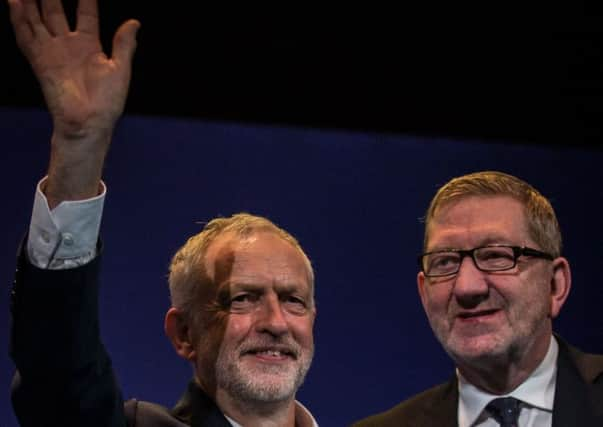Euan McColm: The spectre of Blair is blinding Corbyn to reality


No poll rating is too poor that Corbynistas cannot show, in tortuous detail, how their man has no responsibility. As Labour’s fortunes plummet, any number of scapegoats may be found.
It’s never JC’s fault that the party is speeding towards an electoral cliff edge. Instead, it is down to the malign actions of the “mainstream media” or Labour’s moderates, or both working in cahoots to thwart a decent man.
Advertisement
Hide AdAdvertisement
Hide AdWhen undeniable truths about Mr Corbyn are repeated – his past words of succour for Irish republican terrorists, say, or his associations with antisemites – his acolytes cry foul, blaming a conspiracy of dark forces bent on destroying their party.
Rather than submitting to even a fleeting moment of self-reflection, the Labour leader’s supporters urge him to step on the accelerator and hold steady on his course, as if doing so will, somehow, prevent the bus on which they’re travelling from crashing on to the rocks below.
Since his election in 2015 as Leader of the Opposition, Mr Corbyn has seen (or turned a blind eye to) Labour’s popularity evaporating. Meanwhile, the Tories grow stronger at Westminster and the Scottish Nationalists’ domination of Holyrood remains undiminished.
A new report from Labour-linked think-tank the Fabian Society has, predictably, elicited from Corbynistas the sort of denial that characterises their political strategy.
The Fabians’ warning that Labour may get as little as 20 per cent of the vote and win fewer than 150 seats at the next general election has already been dismissed by Corbyn’s supporters. A glimpse into the foetid pool of social media political debate shows just how enthusiastically these “true Labour” campaigners will reject reality.
The Fabian Society points to Labour’s failure to hold a clear and consistent message on Brexit and its continued lack of support in Scotland as key factors leading to its conclusion that the party is facing defeat on a scale unparalleled in modern history.
Having predicted a dire result, the think-tank suggests Labour seeks to build alliances with other parties in order to have a chance of winning at least a share of power. The Fabians argue that Labour should try to cut deals with the Liberal Democrats and the SNP if it truly wants to get in to government.
On the face of things, this idea makes some sense, but it doesn’t withstand much scrutiny. The Lib Dems currently have just nine MPs and, unless their fortunes take an extraordinary upturn, they simply won’t have the numbers to make a difference (and, anyway, why would the avowedly centrist Lib Dems wish to make a coalition deal with Mr Corbyn’s team of unreconstructed far-left activists?).
Advertisement
Hide AdAdvertisement
Hide AdThe SNP, having won 56 of Scotland’s 59 Westminster seats in 2015, would certainly bring some serious numbers to any deal but the truth is that the Scottish Nationalists – as the daily proclamations of its elected members attest – wish to destroy rather than prop up the Labour Party. The belief that the SNP might rally to Mr Corbyn’s aid betrays considerable naivety.
The Fabian Society is reduced to making such hopeless suggestions because Mr Corbyn and his allies refuse to compromise with the electorate. They will not countenance a moved towards the centre – and thus in the direction of voters – because this would be a sell-out.
This rejection of pragmatism is, I think, tied up in the hatred of former leader Tony Blair which is enjoyed by Corbynistas; they will not take their lead from a man who many consider, because of Britain’s involvement in Iraq more than a decade ago, to be a war criminal.
That Blair led the Labour Party to a hat-trick of general election victories is not a source of pride but of shame to the purer-than-pure Corbyn supporter.
The New Year began with a hint that even one of the Labour leader’s most loyal and powerful allies may be coming round to the reality that he is not going to be the next prime minister. On Monday, Len McCluskey, the oafish leader of the Unite union, suggested that Corbyn and shadow chancellor John McDonnell would feel obliged to step down if there was no shift in opinion polls – currently showing Labour drifting 12 points behind the Conservatives – by 2019.
Who knows, perhaps some miracle will occur and Labour will see a sudden and dramatic reversal in fortunes. However, only a fool would bet on this.
With its most talented MPs on the back-benches, Labour is weak and unfocussed. Mr Corbyn’s Z-list team has helped convince four million voters who backed Labour in 2015 to take their support elsewhere.
The Labour leader’s spinners say that, in the year ahead, he will take forward a radical policy platform, offering “the only genuine alternative to a failed political establishment”.
Advertisement
Hide AdAdvertisement
Hide AdThat’s all well and good, but there is no evidence whatsoever that the wider electorate has any appetite for Mr Corbyn’s alternative vision.
The Fabian Society is dismissed by Corbynistas as a “Blairite” group; its failure to agree with the leader’s vision is simply evidence that it is wrong. But the truth is that Labour members would do well to stop attacking Tony Blair and start examining how it was that he was once able to make their party a landslide-winning political force.